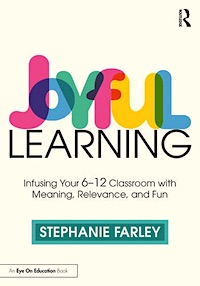
3 Things Assistant Principals Can Do to Make School Better
By Stephanie Farley
 It was the first day of faculty, and I was brimming with anticipation as 250 pupils, school, and staff gathered in the gym. About the summer time, the principal and I formulated a concept for the yr with the intention of reorienting and re-energizing our group.
It was the first day of faculty, and I was brimming with anticipation as 250 pupils, school, and staff gathered in the gym. About the summer time, the principal and I formulated a concept for the yr with the intention of reorienting and re-energizing our group.
Our concept was “school is a put to be joyful,” and to convey this concept we experienced made a video clip in which all of the center faculty instructors and workers danced all around to the song “Happy” by Pharrell Williams.

From our “Happy” online video
The online video output was a loved ones affair, as my husband directed and edited the video clip though my youthful daughter jumped all around in the video dressed as a cheerleader.
I couldn’t wait to display our function to the learners in the very first-working day-of-college assembly. The reaction was even better than I’d hoped, as the young children roared in approval when the video clip finished and clamored to observe it once again.
Going for walks absent from that assembly, my coronary heart was total. I felt we had attained a important purpose: the video communicated the message that the college and employees cared about learners possessing a joyful faculty practical experience.
As the assistant principal, I uncovered learners normally questioned me what just I did all working day. They knew the principal ran the university, but what does an assistant principal do? Make video clips! I claimed.
I could possibly have extra that, in my spare time, I attempted to make confident that kids, lecturers, and family members experienced what they required to be effective and joyful. To do that, I created a 3-move technique to my task as assistant principal. I necessary to:
- Show up
- Hear deeply
- Chill out
When I shared this checklist with students, they generally nodded sensibly and said some thing like “that’s hearth.” For individuals of you who also come across you in the posture of attempting to make sure all people has what they need, I’ll demonstrate the 3 techniques.
1. Display Up
Displaying up is all about remaining in the present second. In today’s parlance, we may well speak about bringing one’s complete self to the process. But it also suggests, actually, “show up.” While it wasn’t a supervisory assignment, I built it my task to be out with the pupils in the course of lunch. This visibility signaled, “Hey, I’m right here if you have to have everything.”
My loitering paid off: in “school culture” surveys college students indicated that getting a principal-type individual noticeable all through lunch contributed to their sense of basic safety. Additionally, I gladly achieved with any particular person who wandered by and wished to chat. I relied on these usually quick, informal meetings to fully grasp the considerations of the neighborhood.

Showing up also means equipping you with a assortment of tactics to deal with the challenges that come up in a university. In my circumstance, I study about learning distinctions, mind science, implicit bias, good psychology, scholar decision, alternative assessment styles, and variety, equity, and inclusion – and experimented with what I acquired in my personal lessons.
Oh yeah…find a way to train! There’s genuinely almost nothing additional discouraging than remaining informed what to do by a man or woman who hasn’t carried out it (or is not accomplishing it) on their own. So figure out how you can have dependable time with college students and resist the preaching of new concepts till you’ve practiced them with individuals learners.
Demonstrating up is standing in the classroom when a instructor desires to use the restroom and standing shoulder-to-shoulder with the trainer when an angry parent appears brandishing a extended record of grievances. It’s listening to the mum or dad who’s upset and figuring out the crux of the problem without the need of permitting the parent’s emotionality to overwhelm you or distort your final decision-generating. It is also discovering a answer, with the trainer, that balances the demands of college student, family, trainer, and college.

Further, exhibiting up implies trying to keep the big photo in thoughts even as you dive into the details. In just one faculty I visited, I saved hearing from teachers that students ended up additional emotionally unstable than they have been a couple many years back, pre-pandemic.
When I requested about the SEL software at the college, the lecturers shook their heads. There was no SEL software. Any social-emotional finding out parts were being up to the lecturers, who snatched minutes from other instruction to get time for an SEL exercise.
Principals (most likely at the urging of APs) can clearly show up by scheduling a weekly, 30-moment SEL action. Develop a decision board for the teachers and provide all the products, pre-packaged and prepared to go, so the only factor academics have to fear about is deciding upon an activity that satisfies the needs of the particular working day.
Last but not least, showing up is attending all the tedious conferences so that you can advocate for teachers and learners. Your presence matters.
2. Hear Deeply
Decades in the past, I attended a workshop on deep listening with counselors from the Stanley King Institute. They were being extraordinary. It was so valuable to me in all of my roles, but it was transformational in my ability to be an successful assistant principal.

Here’s why: deep listening is the antithesis of modern existence, which is twitchy and only 50 percent shelling out awareness. Deep listening usually means that, in its place of talking, you commit your self to listening to what many others say and confirming that you definitely fully grasp the two the text and subtext. My procedure as an assistant principal appeared this this:
1. When an individual (trainer, student or parent) arrived to talk with me, I pulled out a notebook and took notes as they spoke. I listened, nodded, and recurring their terms, inquiring them to confirm I experienced captured the words exactly.
2. Future, I summarized what was claimed and questioned clarifying issues when I received anything incorrect (if you are counting, sure, which is two instances I recurring what was reported to me, and of course, which is deliberate).
3. Right after that, I waited. It’s tricky to hold out. The temptation is to hurry into the silence and say some thing – nearly anything! – so we can assert ourselves as a person of company. But silence is alright. It provides absolutely everyone a chance to think. Specifically, it gave little ones a prospect to believe about what they required me to do with the facts they’d shared.
For some people, deep listening can be deeply irritating for the reason that it’s not action-oriented. There is no judgment getting sent. In its place, it is quiet and rigorous, which is perfect for chilling out.
3. Chill Out
Chilling out, for me, implies working with empathy, compassion, and creative imagination to guidebook final decision-earning. Empathy is expected to have an understanding of the requires of learners, instructors, and families, even though compassion and creativity are required to establish the packages, courses, and insurance policies to serve these requires.

One example of a chilled-out final decision governed by compassion was when a scholar broke a rather serious rule on the past working day of college. He was remorseful and eager to make amends, so he volunteered to clean up out lockers right after anyone had left for the summer.
The university student felt this was a concrete way for him to give back again, and in the long run he mentioned he appreciated the physical character of the process. Some youngsters would have felt cleaning out lockers was cruel and unusual punishment. When students have possibilities about how they restore the local community, the success can be profound.
Chilling out is also about developing the circumstances in which everybody can chill out, which you do by permitting pleasure to thrive. Joy grows when college students and instructors:
● Knowledge a sense of belonging
● Really feel that what they say issues
● See that their strengths have price and reason
● Know that they can have entertaining at college.
The unique form pleasure usually takes relies upon on your university. At my college we not only made movies, but the lecturers also well prepared flash mob-fashion dances to carry out for the students, produced significant scale neighborhood events like political conventions, and taught students how to call politicians to urge motion on issues like homelessness, LGBTQ legal rights, and weather alter.
My role in all of this was to make the means accessible, chill out, and savor the authentic studying occurring all over me. When you demonstrate up, pay attention, and chill out, youngsters, instructors, and family members understand that the assistant principal is basically an agent of pleasure.
 Stephanie Farley has been an English instructor and impartial university administrator for 27 many years. Intrigued in instructional style, assessment, feed-back, and grading, she has served as a Mastery Transcript Consortium Web-site Director and has been on a variety of California Association of Independent Faculties accreditation committees.
Stephanie Farley has been an English instructor and impartial university administrator for 27 many years. Intrigued in instructional style, assessment, feed-back, and grading, she has served as a Mastery Transcript Consortium Web-site Director and has been on a variety of California Association of Independent Faculties accreditation committees.
Stephanie’s book, Joyful Understanding: Equipment to Infuse Your 6-12 Classroom with This means, Relevance, and Enjoyment, will be printed in April, 2023. She has created skilled progress for faculties close to looking at and curriculum and coaches teachers in instruction, lesson organizing, feedback, and evaluation. Pay a visit to her site Joyful Learning and locate her other MiddleWeb articles or blog posts listed here.
